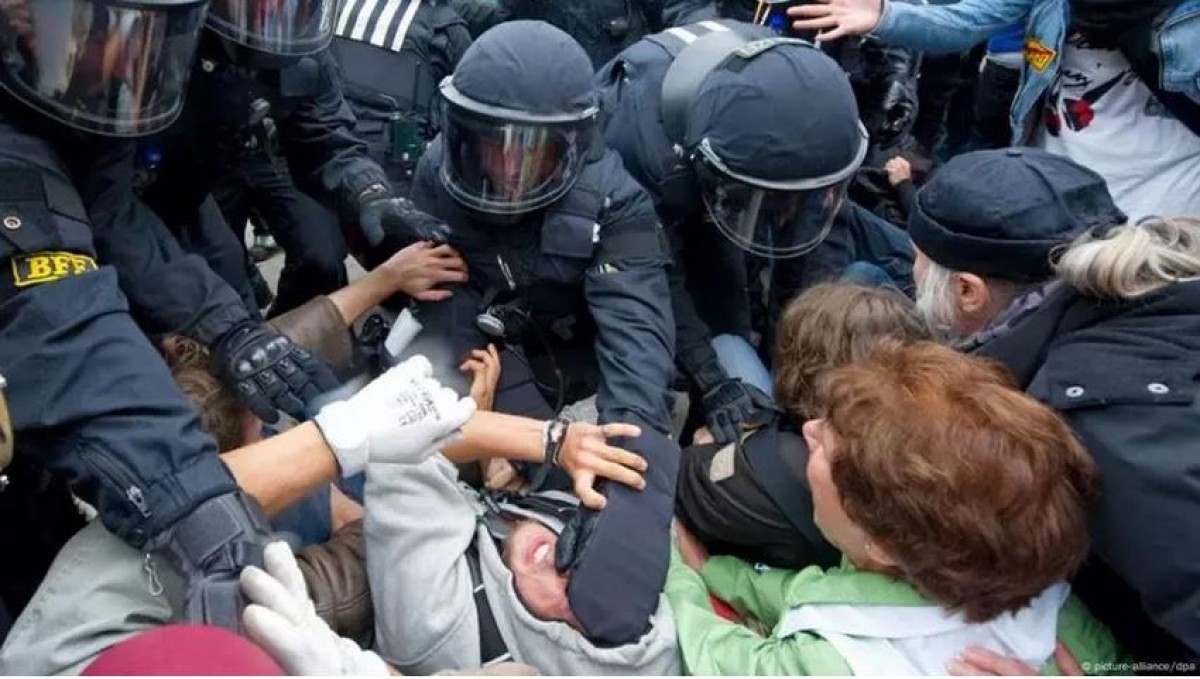 2341
2341
Allegations of Excessive Police Violence Against Protests in Germany
Allegations of Excessive Police Violence Against Protests in Germany
By Pazooki
In Germany, there are growing allegations of excessive police violence against protests, leading to significant public concern. Many criticize the police for responding to demonstrators with undue force and for disregarding basic rights.
The increasing use of excessive force by the German police to suppress protests is alarming and signals a declining respect for democratic rights. Reports of systematic police violence, particularly at politically sensitive demonstrations such as pro-Palestinian rallies and climate protests, are becoming more frequent. These incidents range from the use of pain grips, pepper spray, and batons to extreme measures like kneeling on a person's neck and obstructing their breathing. This approach suggests that the police are not merely trying to control the protests but are deliberately attempting to suppress and intimidate demonstrators to discourage them from taking to the streets. Such actions starkly contrast with the values of a democratic state and raise questions about whether the German police are increasingly abusing their power to criminalize and crush legitimate political dissent.
The structural issues within German police forces are evident and troubling. Police violence often goes unpunished, and the perpetrators are rarely held accountable, revealing a deep institutional failure. The fact that officers are tasked with investigating their colleagues leads to a culture of impunity and undermines trust in the rule of law. Victims of police violence often face counter-charges for resisting arrest, deterring many from reporting abuses. This situation is exacerbated by the lack of independent investigative bodies and the absence of mandatory identification for police officers. Despite repeated calls for transparency and accountability, there appears to be a lack of political will to implement the necessary reforms, further empowering the police in their unchecked exercise of power.
Recently, the German police have been accused of using excessive force against pro-Palestinian demonstrators, with reports that even children as young as seven have been detained and women subjected to sexual violence. In early June, a 7-year-old boy was arrested for allegedly hitting an officer's helmet with his flag, and a 13-year-old was handcuffed after making a rude gesture. On May 29, it was also reported that two teenagers were beaten by police officers. These incidents have been condemned by activists and organizations such as Amnesty International, who have called for investigations into the unlawful conduct of the police. Moreover, there are disturbing reports of sexual assaults by the police, including the violent arrest of a visibly pregnant demonstrator, which further raises concerns about the methods used by German law enforcement. Activists argue that such police violence is part of a broader intimidation tactic against the Palestinian solidarity movement, with many charges against demonstrators being dropped. This has sparked serious concerns about state-sanctioned violence and the suppression of peaceful protests.
Surveillance State and Police Violence: The Veiled Attack on Peaceful Protesters
The German government has indirectly acknowledged that its intelligence services are monitoring pro-Palestinian media, although it has not openly confirmed this to prevent media platforms from evading surveillance. Dr. Otillie Klein, a German Bundestag member known for her collaboration with the right-wing Konrad Adenauer Foundation and her stance on misinformation, raised a parliamentary inquiry regarding whether Red.Media, a platform popular among anti-Israel groups, is being monitored. The government's evasive response suggests that while they are withholding specific details to prevent the media from avoiding surveillance, the monitoring is effectively confirmed.
In response to this surveillance, Red.Media has criticized the German intelligence service, arguing that the monitoring is due to the platform's popularity among pro-Palestinian demonstrators and accusations of inciting protests. The platform condemns the state's actions, highlighting the harsh treatment of anti-genocide protesters and the broader suppression of dissenting voices. This pattern of repression mirrors the actions of the British government under Keir Starmer's leadership, which has increasingly cracked down on peaceful protesters and taken controversial legal measures against environmental activists. This escalating trend of state repression and censorship raises serious concerns about the suppression of dissent and the broader implications for free speech and activism.
How Germany's Political Spectrum is Complicit in Israel's War on Gaza
Germany is currently facing criticism from various quarters for its handling of pro-Palestinian activists amid the ongoing conflict in Gaza. Many view the stance of the German authorities as a deliberate attempt to suppress dissent and stifle any criticism of Israeli policies, which in turn contributes to the ongoing violence in Gaza. In a controversial move, Germany recently introduced a new citizenship law requiring applicants to affirm Israel’s right to exist. Critics see this law as an attack on free speech, as it makes the recognition of Israel a prerequisite for citizenship. Legal experts and human rights advocates have expressed concern about the ethical implications of enforcing political views as part of the naturalization process.
This law is part of a broader trend of measures aimed at curbing pro-Palestinian activism and reinforcing Germany's unwavering support for Israel. The crackdown on pro-Palestinian voices is not limited to the government but extends across the entire political spectrum in Germany, from the left to the right. Despite their ideological differences, the major political parties in Germany appear united in their support for Israel’s military actions in Gaza. This consensus raises questions about the underlying motives and broader implications for German domestic and foreign policy, as well as the country's commitment to human rights and freedom of expression.
 2341
2341
Comment
Post a comment for this article